Marcus Bullock is the CEO and Founder at Flikshop, which was built to be the tech company that helps families connect to their incarcerated loved ones. Users are able to take a picture, add some quick text, press send, and for 99 cents, Flikshop prints and ships that picture and text on a real tangible postcard, that is shipped to any person in any prison anywhere in the United States. Flikshop has connected over 170,000 registered users so far and has shipped over a half a million postcards. That represents over a half million pieces of love.
Marcus started Flikshop as a result of being sentenced to eight years in adult maximum-security prison as a 15-year-old kid after he had stolen a car from a man in a shopping mall parking lot. His mother didn’t want him to fall into a bed of hopelessness so she began to write him letters and send photos while he was in incarcerated, which he attributes as the singular reason that kept him alive and got him through. And now data and research shows that family connectivity is the largest factor towards successful reentry after at release. Marcus, through Flikshop, wanted to ensure that folks around the world had the opportunity to be able to have that same kind of connection, in an environment where Facebook, Instagram, texting or emailing does not exist.
What does entrepreneurship mean to you?
MB: Being able to find a problem and solve it in a very meaningful way. I think the newer defining measures of entrepreneurship are centered around revenue generation, which I think is obviously a big part of entrepreneurship, but that doesn’t catalyze what entrepreneurship means. For me, it means really finding a problem and finding a meaningful way of solving it and hopefully building a system that it continues to attack that problem over and over again and letting others leverage it.
How is your business changed as a result of COVID-19?
MB: We went from having a growing startup, gaining new users and acquiring new customers, with a really cool service to having a company that was necessary as a result of the present visiting room closures that were starting to happen when COVID-19 began to hit. After the prison room closures that were announced around the country, we saw an immediate, 60% sales spike in the very first month. Since then, we still continue to maintain that level of growth month after month. The problem with that is that we have a startup that we were still continuing to build and grow and being very thoughtful about all of the content that we were pushing out and ensuring that we were gaining new users and acquiring new customers, and now we have a very interesting growth problem that we’re working to manage. We’re excited about it, I’m tenacious. I made it through an eight-year prison sentence. I’m sure I can grow, and I can figure out a way to solve a problem for growing business.
Is there a way for people to who may not have a family member or friend who is currently incarcerated to participate?
MB: We have two ways that folks, and the community, are able to participate. And the first way is through our Flikshop Angels program that allows the community members to be able to band together and purchase Flikshop gift cards. Each are loaded with 10 Flikshop credits on them that we give to children with incarcerated parents, allowing them to just scrape off this promo code on the back of their gift card and send mom and dad at least 10 selfies of them, as many as they want, completely for free. You can find out more about that at flikshopangels.com.
But the thing that we’re very excited about working on and building, is The Moment of Empathy app, powered by Flikshop, available in the app store. It is currently designed for businesses, corporations, and teams that want to increase their corporate social responsibility, impact or footprint. These organizations are being very intentional about how to connect the dots and help create resources for folks that are coming out of prison and even their family members. And we’re grateful that they want to leverage our technology in order to be able to do that. I believe this is the way that we leverage scalable technology to reduce recidivism.
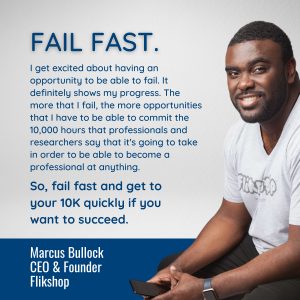 What is your proudest and darkest moments so far, share a key high and key low?
What is your proudest and darkest moments so far, share a key high and key low?
MB: Career wise, my proudest moment was the day we got our app in the App Store. Holistically, having our first child. It was that moment you are released from the hospital. I’m looking at them and my wife is looking at me and we’re like, wait a minute, so you guys trust us to take this little person out of this hospital? That’s it? Okay, I guess I’m a really good person. Something has changed in my life that has made me a really good person. And I was proud. And from that moment I’ve been the protective agent over in my entire family and I’m grateful to be able to be that person.
Now in my career, I was really proud when we launched the app back in June of 2012. That was a magical moment because you’re talking about a guy who was up against so much, trying to figure out a way to introduce a technology into the environment that he just lived in just a few years prior. There was so much skepticism about not only whether or not we will be able to build it but whether or not there will be a customer base that will be willing to accept it. The first day we went to the App Store, we got a customer and I cried. I literally cried.
I have a ton of dark moments that I’m able to talk about. I grew up in prison – tons of dark moments that I feel with that. But I think it will be important for our readers to understand that there are dark moments in entrepreneurship, especially in the startup culture, where it’s driven by Instagram posts that make you feel bad about not doing enough every day when you scroll through your timeline.
I came out of building a very, very successful construction business before I launched Flikshop and I took the revenue from that construction business, dumped into Flikshop just to be able to launch. You gotta sell a lot of 99 cent postcards to keep the bills in order. Because I was starting to spend more time in Flikshop and less time in the construction business, the revenues began to slide in the wrong direction in the construction business and Flikshop was just never enough in order to be able to support me and my family. I was a solo entrepreneur.
One day I had just left an TV interview, Forbes had just done an article on me, I was still driving my BMW, on my way to my amazing top floor office in Dupont Circle, Washington D.C. thanks to a good deal with WeWork, and we had the most impactful app inside the app store. I went to McDonald’s and I wanted to buy a cup of coffee. And I didn’t have enough money in my checking account to be able to buy a $1 cup of coffee. I swiped my card anyway, because there were four cars behind me and that one cup of coffee charged me $1 plus the $35 NSF fee.
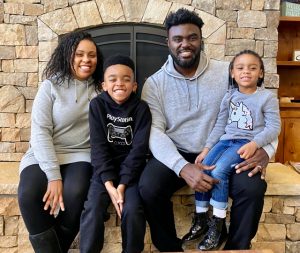 I cried at the light like “Yo, what am I doing wrong? How am I operating a business that’s in Forbes just this morning on my way to my corner office driving this luxury vehicle, and I can’t even afford a cup of coffee.” That was a hard moment. And it took a lot of those hard moments to be able to make it through the day in order to be able to realize I had to keep pushing through it. Because you’re not alone. You’re not the only one. There are benevolent founders before you. On the outside it looks like it’s perfect and everything is all well put together. And inside they feel like they’re crumbling and can’t figure out how to do anything right. I want to let the world know like the entrepreneurs, you got to keep pushing because I promise you, none of us have it figured out.
I cried at the light like “Yo, what am I doing wrong? How am I operating a business that’s in Forbes just this morning on my way to my corner office driving this luxury vehicle, and I can’t even afford a cup of coffee.” That was a hard moment. And it took a lot of those hard moments to be able to make it through the day in order to be able to realize I had to keep pushing through it. Because you’re not alone. You’re not the only one. There are benevolent founders before you. On the outside it looks like it’s perfect and everything is all well put together. And inside they feel like they’re crumbling and can’t figure out how to do anything right. I want to let the world know like the entrepreneurs, you got to keep pushing because I promise you, none of us have it figured out.
How is your company changing the landscape?
MB: There are billion dollar prison phone businesses and tablet companies, and folks that have historically preyed on families suffering from incarceration, and we want to figure out a way to not only democratize communications inside of these facilities but also break down silos between the county jails, the federal system, the state system and all of the others – juvenile, public facilities, private facilities.
We’re excited about creating a platform that makes constant communication affordable for the family members and the corporations and nonprofit organizations that also want to contribute to this space. Eventually some of those others that have come before us will leverage our data and AI technologies. Because of the way that we’re continuously advocating for affordability of communications for this population of people, we believe that that kind of conversation will force companies to begin to shift how they think about building software and even hardware that’s going to go inside. And, ultimately, lowering the cost and then, ultimately, helping us to reduce recidivism.
What do you wish you knew when you started? And what would you do differently if you could?
MB: I wish I’d have known the value of building a team. I was a solo entrepreneur at Flikshop for seven years. I thought that I was smart enough and sharp enough and tenacious enough and hardworking enough to do it all on my own. When all that really equated to was a huge ego and vanity metrics that wouldn’t allow me to be able to build a scalable business. Figure out ways to be able to hire around your deficiencies and then learn how to partner with others. That may dilute your business but by creating a much bigger pie, it will allow you to be able to move faster and accelerate in a world where fast means everything.
What advice or creed do you live by as you grow your business and, or what is your professional and personal mission statement?
MB: Jump out the window and build your parachute on the way down.
Also, fail fast. I think that one of the things that I get excited about is having an opportunity to be able to fail. It definitely shows my progress. It sounds so cliché but the reality of it is that the more that I fail, the more opportunities that I have to be able to commit the 10,000 hours that professionals and researchers say that it’s going to take in order to be able to become a professional at anything. As I think about the hours that Mozart had to put in until he wrote his first major concerto at 21 years old, he had to put in those 10,000 hours. Bill Gates had to put in his 10,000 hours building systems all the way before they thought that it was an overnight success when he built Microsoft. Steve Jobs had to put in his 10,000 hours. And the more and more that I think about those thousands of hours that they had to put in, it wasn’t as a result of their successes. It was only the failures that forced them to put in the next set of hours. So, fail fast and get to your 10K quickly if you want to succeed.
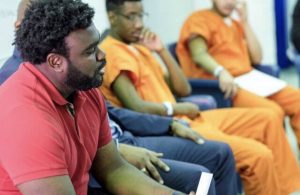 Where do you find inspiration when faced with challenges when faced with challenges?
Where do you find inspiration when faced with challenges when faced with challenges?
MB: It’s a cheat, but I did eight years of prison as a kid. So in the back of my head I’m like, “Yo, you know what your struggle was just a few years ago – trying to figure out how to navigate the beef between Richmond and DC when standing in a rec yard in the middle of August knowing that everybody around you has lawn mower blades down their pants. Today’s obstacles are trying to figure out how to convince a billionaire to give me some money to grow my business. If we don’t do a good job at it, is that the biggest struggle in your life, Marcus? Is that the biggest problem?” What allows me to be able to walk through the world with a level of gratefulness is that I even have these kinds of problems. I have best friends that are sitting in a cell right now that will literally chop their whole right arm off just to be able to have a fraction of what I complain about every day. And that allows me to be able to have a perspective that I think that others just aren’t blessed to be able to have because they didn’t have my experiences.
What does success look like for you? And what do you think you will help you achieve it.
MB: Success is being able to create environments where there’s equity amongst entrepreneurs – raising capital, gaining resources, building systems around business models, creating stronger reentry paths for entrepreneurs that are sitting in cells and know they want to come home to build awesome businesses but just don’t have access or the belief from the community. I think that these are going to be the largest contributors to what’s going to change justice reform efforts when we have that level of support. We are not a nonprofit because we are able to build a sustainable business that’s going to provide real wealth for not only myself but my team, our executive members, and a pathway for others to be able to see that it’s possible to be able to be done. I have to change the narrative and I’m excited about being the one to do that.
Has your definition of success changed since COVID started?
MB: It’s like a perfect storm of a worldwide pandemic, to someone having a knee on their neck, and conversations around equity being held inside any one of the industries that have typically been reserved for those that don’t look like me. Today, we are having very, very important conversations that are shifting the way that America, and the entire world, thinks about founders and just Black people in general. I think that COVID has changed that for me, but I think that it’s definitely changed for the better. We’re having conversations that we would have never had with venture capital. The level of intention that folks are now having when they’re opening these doors to these Zoom calls, it’s something that I hadn’t witnessed before and I’m grateful for it.
What’s it like to work alone or with your partners?
MB: It’s hard. It’s challenging for us because I’ve been a solo founder for the majority of my journey. We hired our team in November, only a few months before COVID happened, but we are all remote anyway. We were already thinking about how to be more resourceful remotely anyway. So we’ve been working in isolation but still figuring out ways to be able to band together as a team.
Many entrepreneurs continue to perfect their daily routines to support their work and greater vision. Would you mind sharing your morning routine or regular ritual that grounds your work each day and has it changed in recent months?
MB: It actually has changed in recent months. I have to find a way to be able to maintain focus throughout the day in a different way because I have two small children. One is nine and one is four, and that is very interesting. I have to figure out ways to manage my own sanity. It was a combination of all of these things that put the emotional and mental strain that forced me to say, I got to figure out a way to manage this. And so what I’ve started doing over the last month and a half is, every morning, when my wife used to be responsible for taking the dog out, I now take the dog out every morning and I go for a morning jog. I get a couple of miles in. I come back in the house. I have prayer time. I’m able to have that exercise and prayer time with just myself before the kids get up and then I’m able to start my day off with positive energy flowing through in my body. Physically, I feel ready to get started and it’s working.
What keeps you motivated?
MB: I want to have a euphemistic way to say, I’m figuring out what to take care of my family, but I don’t have one. So, figuring out a way to take care of my family. Being a startup CEO – and we haven’t gotten to the point where we have the revenue that can maintain the business – we have to fundraise in order to be able to support the company. Having that uncertain money issue is always one of the things that can be a gorilla on your back, as a founder. Which is also one of the reasons why it’s equally as challenging to be a Black founder: when you have those kinds of economic issues that are compounded by lack of access and social capital issues, as well.
What kind of entrepreneur do you want to be known as or what do you want your legacy to be?
MB: [I want my legacy to be] that we significantly reduce recidivism. We want to get people out of prison and keep them out of prison.
What is the quote or some words of wisdom that help you get through the tough days?
MB: Jay-Z said, “The one thing that separated us from everyone else is that we didn’t give up.”
Do you believe that those that were formerly incarcerated are more drawn to the pursuit of entrepreneurship? Why do you think that’s the case, if so?
MB: I think, yes. I think it’s driven by the fictitious story that’s been told about what entrepreneurship can deliver for you. I think that narrative is beginning to change. And as the economies have changed and the entrepreneurs change, the generations continue to evolve. Digital web 2.0 completely reshaped how we thought about entrepreneurship and what it looked like and how to build these kinds of businesses, especially at younger ages. What it did was shape an entire generation to think that if the kid in the garage can build it, I can, too. What that allowed us to be able to do as entrepreneurs that sat behind cages, was to have the opportunity to just bury ourselves in ideas.
One of the reasons why I go to that part of the conversation is that one, that’s challenging for anyone. To live in a generation where they see everyone potentially succeeding in a world where they are not, right? But I think, there’s a heavier weight for someone that’s in prison because they believe, their perception, is that their appearance to the world is one of failure. And that desire to overcome, combined with the desire to build this thing that looks really sexy – of course they see entrepreneurship as an option.
I think the interesting thing that most entrepreneurs that come out of prison learn, is that there are other collateral consequences, as a result of incarceration, that will add an exponent to those other natural entrepreneurial desires that will force them to say, you know, “Well, clearly, I’ve been isolated and boxed in to have only one option. And that’s to be an entrepreneur.” And I think that that’s the reason why we’re seeing more of a trend towards entrepreneurship for those coming out of prison. We’re living in a culture where it’s possible to be able to overcome some of those barriers that you once had as a result of being a felon. And so, if I had a hypothesis, I would say that, over the coming years, you’re going to see more solutions being driven and built by innovative founders, that are coming out of underserved communities.
Do you have someone you’d like to nominate to be profiled in our Faces of Entrepreneurship series? Please let us know by emailing media@thecenter.nasdaq.org.
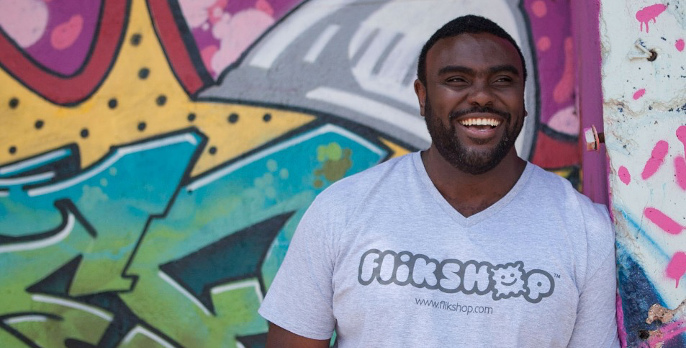
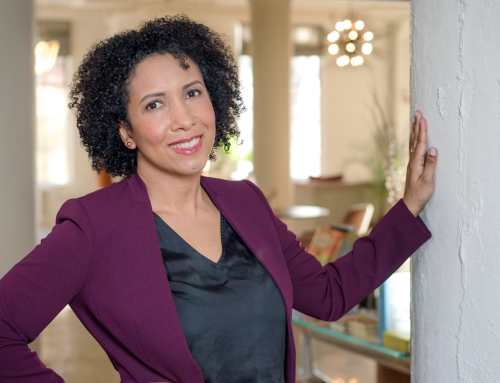
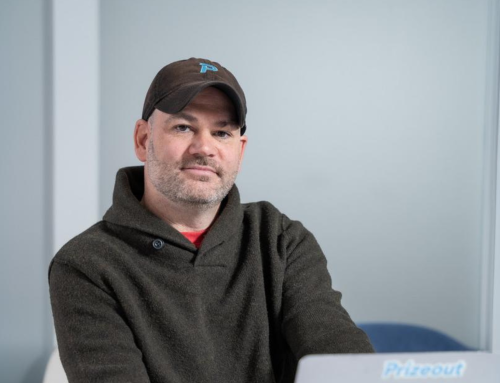
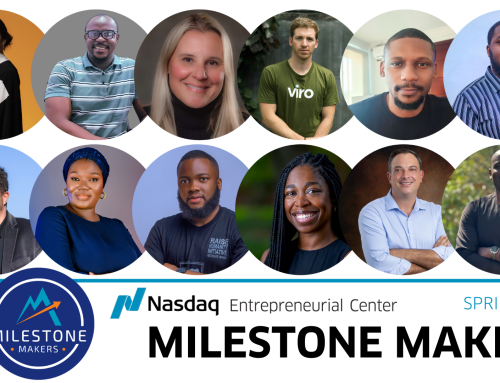
Invite a Friend
Close